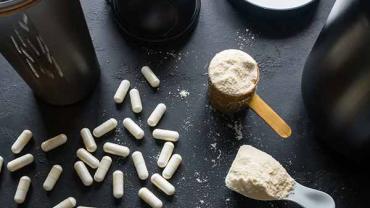
Creatine is among the most popular ergogenic aids for sports and exercise. As a nitrogenous organic compound, 95 percent of which is stored in muscle, it is proposed that large doses of creatine can enhance athletic performance by delaying muscle fatigue, particularly during high-intensity interval training. Claims have been made that creatine supplementation promotes gains in muscle strength and size, but this may be an indirect effect of increasing metabolic energy in skeletal muscle, allowing for a greater duration and intensity of training.
Most high-intensity interval training relies on quick sources of energy including free ATP and ATP-creatine phosphate (ATP-CP), before moving into the glycolytic system. So, in theory, supplying extra creatine could extend the supply of ATP-CP, delaying muscle fatigue and the necessity for shifting toward glycolysis. The ATP-CP is short-lived and this has created questions regarding the true efficacy of creatine supplementation for exercise performance. Research indicates it’s an effective ergogenic aid, but the exact mechanism of action remains to be fully elucidated.
In a two-group matched, double blind, placebo-controlled design of nineteen male soccer players randomly assigned creatine monohydrate supplementation or placebo, those consuming creatine monohydrate (0.03 g/kg/d for 14 d) had significant increases in muscle power output and total work. A meta-analysis showed that approximately 64 percent of studies measuring body mass and/or body composition noted a statistically significant increase in lean body mass due to creatine supplementation, but this effect was theorized to be a result of creatine’s osmotic properties increasing intracellular water. Research supports creatine supplementation to enhance performance and body composition, but only with short-duration, maximal-intensity resistance training.
Creatine for Obesity
The benefits of creatine go beyond its ergogenic effects. A recent in vivo study suggests a strong role for creatine metabolism in energy expenditure and diet-induced thermogenesis, potentially acting as a defense against diet-induced obesity. When the rate-limiting enzyme of creatine biosynthesis, glycine amidinotransferase (GATM), was inactivated in adipose tissue, energy expenditure was suppressed, leading to diet-induced obesity.
Creatine for Cognitive Performance
Creatine also plays a role in cognitive performance because the brain contains a significant pool of creatine. Many neurological and neurodegenerative conditions include impairments in oxygen supply to the brain, leading to compromised brain function. Creatine, however, is able to replenish ATP energy apart from an oxygen supply and has been shown to be neuroprotective against hypoxic damage. A study of 15 healthy adults given creatine for 7 days showed a 9.2 percent increase in creatine in the brain. When an oxygen deficit was created, impairing neuropsychological processes, creatine supplementation restored cognitive performance and increased corticomotor excitability. Other studies have shown creatine to be neuroprotective in traumatic brain injury, Huntington’s Disease, amyotrophic lateral sclerosis (ALS), cerebral ischemia, and Parkinson’s Disease.
Creatine for Systemic Inflammation
Creatine supplementation has been shown to have potent anti-inflammatory properties in animal models where acute and chronic inflammation was induced by multiple agents including carrageenan, serotonin, nystatin, and formaldehyde. Each model represented a different inflammatory pathway, and creatine was able to effectively suppress each pathway.
Creatine is widely available through the diet in milk, red and white meat, fish, and mollusks. The typical diet supplies about 1 to 2 grams of creatine daily. It can also be synthesized from the amino acids arginine, methionine, and glycine. Creatine supplementation for sports performance is often taken in doses ranging from 0.07 grams per kg body weight per day to 5 grams per day. However, during a “loading period” of up to 7 days, large doses of 20 to 25 grams per day may be employed before decreasing to a maintenance level for several weeks. Past studies have shown supplemental creatine to increase muscle creatine concentrations by 20 percent.
Creatine is clearly more than an ergogenic aid. Its additional benefits are still being explored and span into the territory of energy expenditure, brain health and immune function, making this a compound with broad applications for health and wellness.